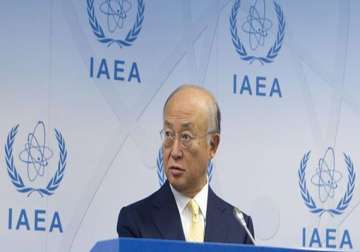New Delhi, Mar 13: The Fukushima nuclear disaster in Japan was a “big wake up call” to the world on nuclear safety, said UN nuclear watchdog chief Yukiya Amano here Wednesday lauding India's enhanced safety efforts at the Tarapur nuclear power plant.
“Safety must come first. Fukushima accident was a big wake up call for every country, everyone on the importance of safety.
I visited Tarapur site and witnessed the serious efforts, enthusiasm… to further improve, further enhance the level of safety,” Amano said here at a press briefing.
The nuclear watchdog chief described India “as a very important partner in nuclear security, nuclear security means to prevent fissile material and radioactive material falling into the hands of terrorists.”
Amano said India's participation at the IAEA Nuclear Security Ministerial level meeting in July at Vienna would “add political weight to this conference and to this important issue.
The implementation of India Specific Safeguard Agreement is being implemented very smoothly and we have had meetings between your experts and other experts to bring into force additional protocol and some other issues.
I am very confident that the implementation of this agreement India Specific Safeguard Agreement will be very smooth,” he said.
Foreign Secretary Ranjan Mathai said he had briefed Amano on India's plans for major expansion of nuclear programme.
“India views nuclear energy as an essential element of its national energy basket and is committed to taking forward its three stage nuclear programme based on a closed fuel cycle.”
He said India has longstanding constructive relations with the IAEA on safeguards implementation. “After the conclusion of the India-Specific Safeguards Agreement in 2008, 12 nuclear power plant units and seven other facilities have been offered for safeguards under the India Specific Safeguards Agreement,” Mathai said.
“We are at an advanced stage of consultations with the Agency relating to our Additional Protocol and India will ratify once these discussions are concluded,” Mathai added.
“We will remain engaged on various proposals for securing sensitive materials and technologies,” he stressed.
“As a major nuclear industry country with the capability to produce all items for a complete nuclear fuel cycle, India is committed to maintaining the highest export control standards.
I am happy to announce that the national SCOMET (Special Chemicals, Organisms, Materials, Equipment and Technologies), list has been updated to be on par with the current NSG and MTCR (Missile Technology Control Regime) lists.
In some respects, our controls are more stringent than those practiced by the NSG and MTCR,” Mathai added.
Latest India News
